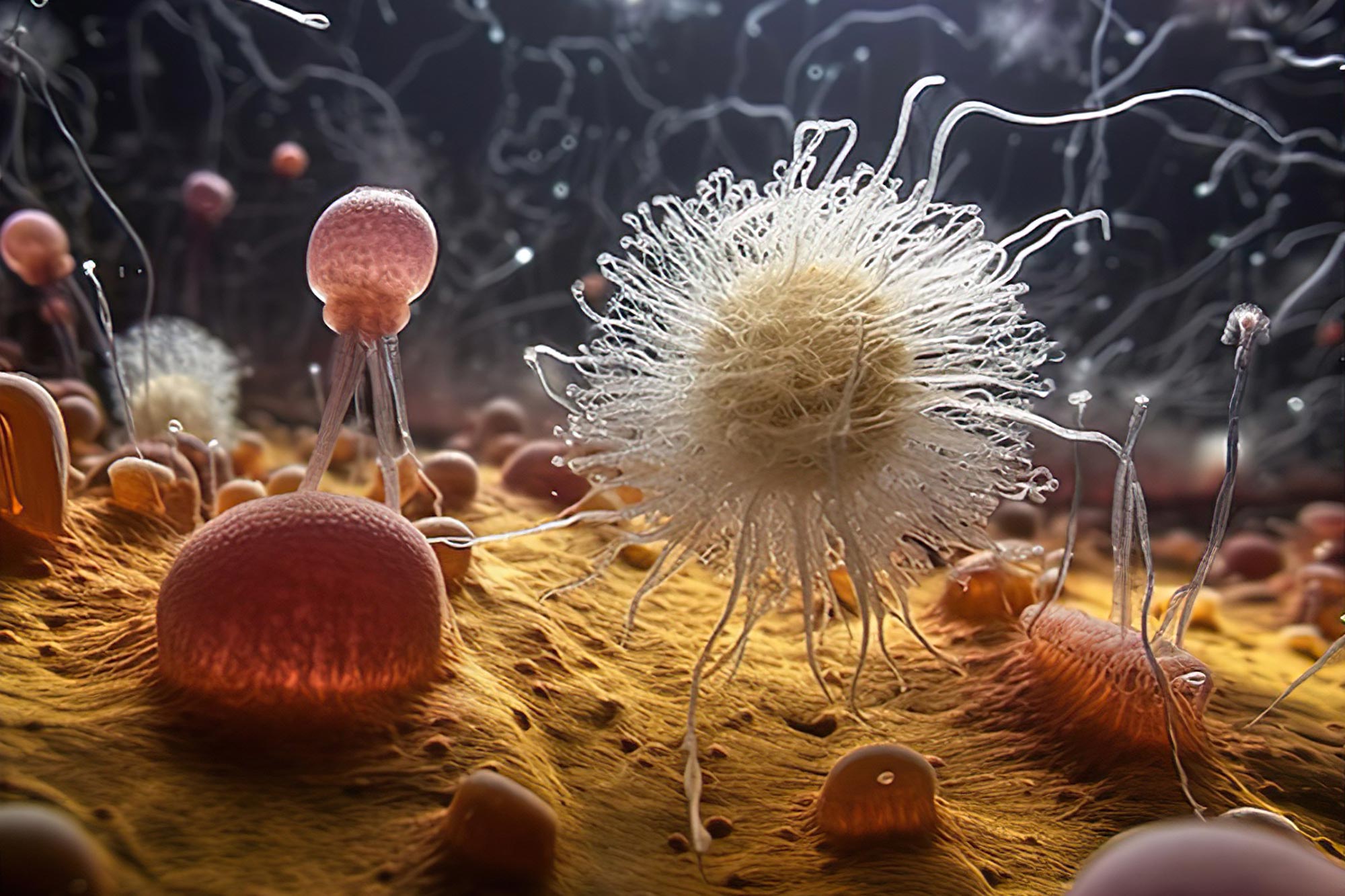
por
Imaginación artística de un grupo de eucariotas primitivos de la «biota de protosterol» que viven en una estera bacteriana en el fondo del océano. Según los fósiles moleculares, los organismos de Protosterol Biota vivieron en los océanos desde hace aproximadamente 1,6 a 1,0 mil millones de años y son nuestros ancestros más antiguos conocidos. Crédito: Organizado en MidJourney por TA 2023
Un equipo de investigación multinacional ha encontrado protoesteroides antiguos en las rocas, lo que indica que existió vida compleja hace 1.600 millones de años. Estas moléculas proporcionan una nueva perspectiva sobre la evolución de la vida compleja y reconcilian las discrepancias entre los registros fósiles de lípidos y tradicionales.
Resulta que el registro recién descubierto de los llamados protoesteroides fue sorprendentemente abundante durante la Edad Media de la Tierra. Las moléculas primordiales se produjeron en una etapa temprana de la complejidad de los eucariotas, extendiendo el registro actual de esteroles fósiles más allá de los 800 e incluso hace 1600 millones de años. Eucariotas es un término dado al reino de la vida que incluye todos los animales, plantas y algas y se separa de las bacterias por tener una estructura celular compleja que incluye un núcleo, así como un mecanismo molecular más complejo.
«Lo más destacado de este descubrimiento no es simplemente una extensión del registro molecular actual de los eucariotas», dice Christian Hollmann, uno de los co-científicos del Centro Alemán de Investigación de Geociencias (GFZ) en Potsdam. «Dado que el último ancestro común de todos los eucariotas modernos, incluidos los humanos, probablemente pudo producir esteroles modernos ‘regulares’, es probable que los eucariotas responsables de estas raras firmas pertenezcan al tronco del árbol filogenético».

Benjamin Nettersheim, uno de los autores principales del estudio, examina mapas elementales y moleculares de superresolución de muestras de rocas de 1640 millones de años analizadas en el Laboratorio de Imágenes Moleculares Geobiológicas de MARUM. Crédito: MARUM – Centro de Ecología Marina, Universidad de Bremen; en Descamps
Este «tocón» representa el linaje ancestral común que fue el precursor de todas las ramas vivas de los eucariotas. Sus representantes se extinguieron hace mucho tiempo, pero los detalles de su naturaleza pueden arrojar más luz sobre las circunstancias que rodean la evolución de la vida compleja. Aunque se necesita más investigación para evaluar qué porcentaje de protoesteroides puede tener una fuente bacteriana poco común, el descubrimiento de estas nuevas moléculas no solo reconcilia el registro geológico de los fósiles tradicionales con el de las moléculas de grasa fósil, sino que brinda una visión rara y sin precedentes del mundo. perdido de la vieja vida. La desaparición competitiva de los eucariotas del grupo de tallos, marcada por la primera aparición de estromales fósiles modernos hace unos 800 millones de años, puede reflejar uno de los eventos más duraderos en la evolución de una vida cada vez más compleja.
agrega Benjamin Nittersheim de Marom, Universidad de Bremen, quien fue coautor del estudio con Jochen Brooks de[{» attribute=»»>Australian National University (ANU) – “due to potentially adverse health effects of elevated cholesterol levels in humans, cholesterol doesn’t have the best reputation from a medical perspective. However, these lipid molecules are integral parts of eukaryotic cell membranes where they aid in a variety of physiological functions. By searching for fossilized steroids in ancient rocks, we can trace the evolution of increasingly complex life.”

Dr. Nettersheim inserts a thin section and rock slices of 1.64 billion-years old rocks into the 7T solariX XR FT-ICR-MS equipped with a MALDI source at the Geobiomolecular Imaging Laboratory at MARUM. As part of ongoing research into mid-Proterozoic biomarker signatures at MARUM, GFZ and the Australian National University, Dr. Nettersheim aims to zoom into the cradle of eukaryotic life in unprecedented resolution. Credit: MARUM – Center for Marine Environmental Sciences, University of Bremen; V. Diekamp
Nobel laureate Konrad Bloch had already speculated about such a biomarker in an essay almost 30 years ago. Bloch suggested that short-lived intermediates in the modern biosynthesis of steroids may not always have been intermediates. He believed that lipid biosynthesis evolved in parallel with changing environmental conditions throughout Earth history. In contrast to Bloch, who did not believe that these ancient intermediates could ever be found, Nettersheim started searching for protosteroids in ancient rocks that were deposited at a time when those intermediates could actually have been the final product.
But how to find such molecules in ancient rocks? “We employed a combination of techniques to first convert various modern steroids to their fossilized equivalent; otherwise, we wouldn’t have even known what to look for,” says Jochen Brocks. Scientists had overlooked these molecules for decades because they do not conform to typical molecular search images. “Once we knew our target, we discovered that dozens of other rocks, taken from billion-year-old waterways across the world, were oozing with similar fossil molecules.”
The oldest samples with the biomarker are from the Barney Creek Formation in Australia and are 1.64 billion years old. The rock record of the next 800 million years only yields fossil molecules of primordial eukaryotes before molecular signatures of modern eukaryotes first appear in the Tonian period. According to Nettersheim “the Tonian Transformation emerges as one of the most profound ecological turning points in our planet´s history“. Hallmann adds that “both primordial stem groups and modern eukaryotic representatives such as red algae may have lived side by side for many hundreds of millions of years”. During this time, however, the Earth’s atmosphere became increasingly enriched with oxygen – a metabolic product of cyanobacteria and of the first eukaryotic algae – that would have been toxic to many other organisms. Later, global “Snowball Earth” glaciations occurred and the protosterol communities largely died out. The last common ancestor of all living eukaryotes may have lived 1.2 to 1.8 billion years ago. Its descendants were likely better able to survive heat and cold as well as UV radiation and displaced their primordial relatives.
“Earth was a microbial world for much of its history and left few traces,” Nettersheim concludes. Research at ANU, MARUM and GFZ continues to pursue tracing the roots of our existence – the discovery of protosterols now brings us one step closer to understanding how our earliest ancestors lived and evolved. Shooting at the ancient rocks with a laser coupled to an ultra-high resolution mass spectrometer in MARUM’s globally unique Geobiomolecular Imaging Laboratory, Dr. Nettersheim and his international collaborators aim at zooming into the cradle of eukaryotic life in unprecedented resolution to further improve our understanding of our early ancestors in the future.
Reference: “Lost world of complex life and the late rise of the eukaryotic crown” by Jochen J. Brocks, Benjamin J. Nettersheim, Pierre Adam, Philippe Schaeffer, Amber J. M. Jarrett, Nur Güneli, Tharika Liyanage, Lennart M. van Maldegem, Christian Hallmann and Janet M. Hope, 7 June 2023, Nature.
DOI: 10.1038/s41586-023-06170-w
Participating Institutions:
- Research School of Earth Sciences, The Australian National University, Canberra, Australia
- MARUM – Center for Marine Environmental Sciences, University of Bremen, Bremen, Germany
- Faculty of Geosciences, University of Bremen, Bremen, Germany
- Université de Strasbourg, CNRS, Institut de Chimie de Strasbourg, Strasbourg, France
- Northern Territory Geological Survey, Darwin, Australia
- German Research Center for Geosciences (GFZ), Potsdam, Germany
MARUM produces fundamental scientific knowledge about the role of the ocean and the ocean floor in the total Earth system. The dynamics of the ocean and the ocean floor significantly impact the entire Earth system through the interaction of geological, physical, biological and chemical processes. These influence both the climate and the global carbon cycle, and create unique biological systems. MARUM is committed to fundamental and unbiased research in the interests of society and the marine environment, and in accordance with the Sustainable Development Goals of the United Nations. It publishes its quality-assured scientific data and makes it publicly available. MARUM informs the public about new discoveries in the marine environment and provides practical knowledge through its dialogue with society. MARUM cooperates with commercial and industrial partners in accordance with its goal of protecting the marine environment.

«Experto en la web. Fanático de la cerveza exasperantemente humilde. Fanático del tocino. Creador típico. Experto en música».





More Stories
¿Cómo se hicieron los agujeros negros tan grandes y rápidos? La respuesta está en la oscuridad.
Una vaca marina prehistórica fue devorada por un cocodrilo y un tiburón, según los fósiles
El lanzamiento del cohete Falcon 9 de SpaceX se ha detenido a medida que se acercan dos importantes misiones de vuelos espaciales tripulados.